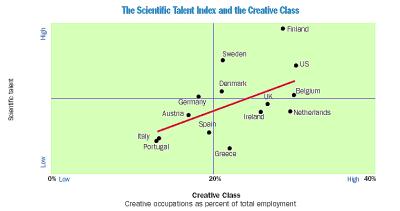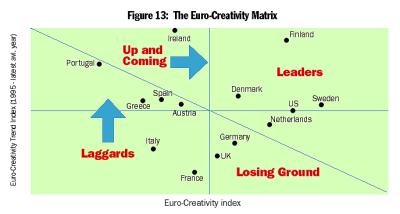Steuergerechtigkeit?
von cc am 10.08.2006
Die hier geführte Debatte über die Erbschaftssteuer möchte ich (auch nach ein paar Recherchen) weiterführen.
Ist doch das Kriterium Steuergerechtigkeit sehr wichtig.
Natürlich werden, gemessen am Steueraufkommen auch in unserem Steuerkonzept erhöhte Energieabgaben dominant sein (v.a.aus Gründen der Senkung der Arbeitslosigkeit, um den Faktor Arbeit steuerlich deutlich zu entlasten zu können.
Trotzdem, ein "Problem" der Energiesteuern besteht darin, dass sie nicht oder kaum umverteilend wirken.
Es ist völlig unverständlich, dass Österreich, anders als durchaus "kapitalistische" Länder, wie die Schweiz oder die USA, Vermögen kaum besteuert:
Vermögensbez.Steuern Ö: 1,3
in der EU: 5,3
(in % des Abgabenaufkommens)
Das ist schlicht ungerecht und ungerechtfertigt.
Dass es geht, zeigen viele andere Länder.
Auch wir sollten das tun, und ich meine, dass es dafür auch Mehrheiten in der Bevölkerung gibt.
Z.B. sollte endlich zwischen klar gemeinnützigen Stiftungen und solchen, die bloss auch fiskalischen Gründen existieren klar unterschieden werden.
Anbei einige sehr interessante Zahlen von Bruno Rossmann, einem Ökonomen, der unser Team im Nationalrat ab Oktober verstärken wird:
Im Bundesministerium für Finanzen liegt eine Statistik über die Bemessungsgrundlagen der Erbschafts- und der Schenkungssteuer vor, die verschiedene Vermögenskategorien (Einheitswert des land- und- forstwirtschaftlichen Vermögens sowie der übrigen Grundstücke, Gutha-ben bei Banken, Wertpapieren, Betriebsvermögen, Hausrat etc.) getrennt für die Erbschafts- und Schenkungssteuer sowie die Zahl der Fälle ausweist.
Von der gesamten Bemessungsgrundlage der Erbschaftssteuer in Höhe von ca. 2,2 Mrd. € (Aktiva; d.h. ohne Berücksichtigung der Passiva, die bei der Ermittlung der steuerpflichtigen Bemessungsgrundlage abzuziehen sind) entfallen im Jahr 2005 etwas mehr als 1% auf land- und forstwirtschaftliches Vermögen, rund 36% auf die übrigen Grundstücke und gut 3% auf Betriebsvermögen. Ins Gewicht fallen weiters die Guthaben bei Banken (27%) und mit 12% erbschaftssteuerfreie Wertpapiere. Von der gesamten Bemessungsgrundlage bei der Schen-kungssteuer von etwa 1,2 Mrd. € entfallen im Jahr 2005 etwa 1 1/2% auf land- und forstwirt-schaftliches Vermögen, 18% auf die übrigen Grundstücke und ca. 52% auf Betriebsvermögen, wovon 94% auf Anteile an Kapitalgesellschaften entfallen. Gut 14% der Bemessungsgrundla-ge entfallen auf die Schenkung von Bargeld. Damit zeigt sich, dass im Rahmen der Erb-schaftssteuer die Grundstücke der privaten Haushalte eine dominante Rolle haben. Die Schenkungssteuer hingegen wird durch die Übertragung von Betriebsvermögen sowie durch Schenkungen von Bargeld dominiert. Die überragende Bedeutung des Betriebsvermögens bei Schenkungen ist wohl mit den Privatstiftungen in Zusammenhang zu bringen.
Wird der Anteil der Erbschafts- und Schenkungssteuer in Österreich von gut 0,09% des BIP auf 0,19% des BIP (EU-15-Durchschnitt für das Jahr 2004) angehoben, dann ließe sich ein Aufkommen von insgesamt gut 450 Mio. € erzielen. Geht man von den oben ermittelten Vermögensübertragungen in der Höhe von 15 Mrd. € (2000) aus, dann bedarf es eines durch-schnittlichen Steuersatzes von 3%, um zum Durchschnitt der EU-15 aufzuschließen. Es ist allerdings zu berücksichtigen, dass in den 15 Mrd. € nicht nur Grundvermögen (private Haus-halte, land- und forstwirtschaftliches Vermögen, Betriebsvermögen), sondern auch erb-schaftssteuerbefreite inländische Bankguthaben und Forderungswertpapiere enthalten sind. Bleiben diese weiterhin erbschaftssteuerfrei, dann ist ein höherer Steuersatz notwendig, um ein Aufkommen von 450 Mio. € zu erreichen und damit zum europäischen Durchschnitt auf-zuschließen.
Ist doch das Kriterium Steuergerechtigkeit sehr wichtig.
Natürlich werden, gemessen am Steueraufkommen auch in unserem Steuerkonzept erhöhte Energieabgaben dominant sein (v.a.aus Gründen der Senkung der Arbeitslosigkeit, um den Faktor Arbeit steuerlich deutlich zu entlasten zu können.
Trotzdem, ein "Problem" der Energiesteuern besteht darin, dass sie nicht oder kaum umverteilend wirken.
Es ist völlig unverständlich, dass Österreich, anders als durchaus "kapitalistische" Länder, wie die Schweiz oder die USA, Vermögen kaum besteuert:
Vermögensbez.Steuern Ö: 1,3
in der EU: 5,3
(in % des Abgabenaufkommens)
Das ist schlicht ungerecht und ungerechtfertigt.
Dass es geht, zeigen viele andere Länder.
Auch wir sollten das tun, und ich meine, dass es dafür auch Mehrheiten in der Bevölkerung gibt.
Z.B. sollte endlich zwischen klar gemeinnützigen Stiftungen und solchen, die bloss auch fiskalischen Gründen existieren klar unterschieden werden.
Anbei einige sehr interessante Zahlen von Bruno Rossmann, einem Ökonomen, der unser Team im Nationalrat ab Oktober verstärken wird:
Im Bundesministerium für Finanzen liegt eine Statistik über die Bemessungsgrundlagen der Erbschafts- und der Schenkungssteuer vor, die verschiedene Vermögenskategorien (Einheitswert des land- und- forstwirtschaftlichen Vermögens sowie der übrigen Grundstücke, Gutha-ben bei Banken, Wertpapieren, Betriebsvermögen, Hausrat etc.) getrennt für die Erbschafts- und Schenkungssteuer sowie die Zahl der Fälle ausweist.
Von der gesamten Bemessungsgrundlage der Erbschaftssteuer in Höhe von ca. 2,2 Mrd. € (Aktiva; d.h. ohne Berücksichtigung der Passiva, die bei der Ermittlung der steuerpflichtigen Bemessungsgrundlage abzuziehen sind) entfallen im Jahr 2005 etwas mehr als 1% auf land- und forstwirtschaftliches Vermögen, rund 36% auf die übrigen Grundstücke und gut 3% auf Betriebsvermögen. Ins Gewicht fallen weiters die Guthaben bei Banken (27%) und mit 12% erbschaftssteuerfreie Wertpapiere. Von der gesamten Bemessungsgrundlage bei der Schen-kungssteuer von etwa 1,2 Mrd. € entfallen im Jahr 2005 etwa 1 1/2% auf land- und forstwirt-schaftliches Vermögen, 18% auf die übrigen Grundstücke und ca. 52% auf Betriebsvermögen, wovon 94% auf Anteile an Kapitalgesellschaften entfallen. Gut 14% der Bemessungsgrundla-ge entfallen auf die Schenkung von Bargeld. Damit zeigt sich, dass im Rahmen der Erb-schaftssteuer die Grundstücke der privaten Haushalte eine dominante Rolle haben. Die Schenkungssteuer hingegen wird durch die Übertragung von Betriebsvermögen sowie durch Schenkungen von Bargeld dominiert. Die überragende Bedeutung des Betriebsvermögens bei Schenkungen ist wohl mit den Privatstiftungen in Zusammenhang zu bringen.
Wird der Anteil der Erbschafts- und Schenkungssteuer in Österreich von gut 0,09% des BIP auf 0,19% des BIP (EU-15-Durchschnitt für das Jahr 2004) angehoben, dann ließe sich ein Aufkommen von insgesamt gut 450 Mio. € erzielen. Geht man von den oben ermittelten Vermögensübertragungen in der Höhe von 15 Mrd. € (2000) aus, dann bedarf es eines durch-schnittlichen Steuersatzes von 3%, um zum Durchschnitt der EU-15 aufzuschließen. Es ist allerdings zu berücksichtigen, dass in den 15 Mrd. € nicht nur Grundvermögen (private Haus-halte, land- und forstwirtschaftliches Vermögen, Betriebsvermögen), sondern auch erb-schaftssteuerbefreite inländische Bankguthaben und Forderungswertpapiere enthalten sind. Bleiben diese weiterhin erbschaftssteuerfrei, dann ist ein höherer Steuersatz notwendig, um ein Aufkommen von 450 Mio. € zu erreichen und damit zum europäischen Durchschnitt auf-zuschließen.






























